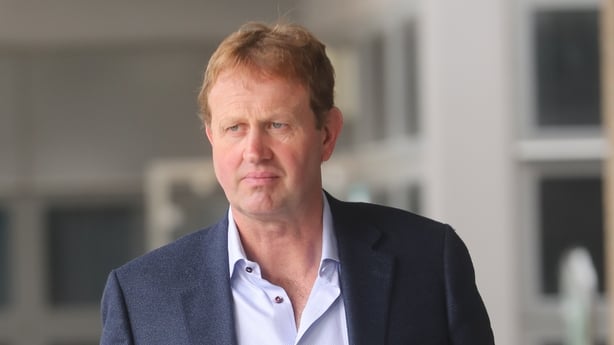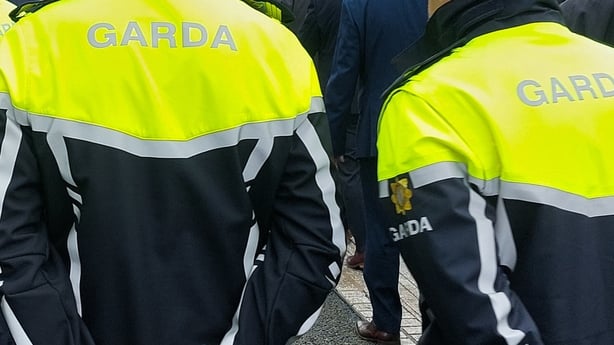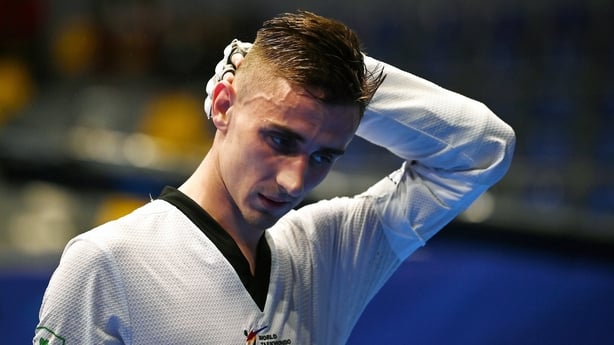Lawlessness in Dublin's inner city has been a problem for a number of years, Fianna Fáil's justice spokesperson Jim O'Callaghan has said.
His comments come after an attack on an American tourist in Dublin city centre on Wednesday night.
The 57-year-old man had just left his guesthouse accommodation on Talbot Street when the attack took place.
He was kicked and beaten by a group of youths on Store Street and gardaí believe his injuries are life-changing.
The man was taken to Beaumont Hospital where he remains in intensive care.
Speaking on RTÉ's Morning Ireland, Mr O'Callaghan said that lawlessness in the inner city has been a problem for a number of years.

The TD for Dublin Bay South said that stamping out all types of criminality is impossible, but the only way to make people feel safer on the streets in the short term is to recruit more gardaí.
He described the current recruitment of gardaí as a crisis, saying that, despite funding, 1,000 new gardaí will not be recruited this year.
He pointed out that the number of gardaí remains the same as 20 years ago despite a population increase. He said this is "not enough".
"We need as policymakers to introduce measures to get numbers in An Garda Síochána up so we can get more gardaí on the street," said Mr O'Callaghan.
He described the situation as damaging to tourists and those coming into the country, but also to people who live in the inner city.
"They shouldn’t have to live with this level of lawlessness and threat," said Mr O'Callaghan.
Read more: 'No one is really safe' - street crime in Dublin's north inner city
Minister for Justice Helen McEntee and Minister for Public Expenditure Paschal Donohoe met with Assistant Garda Commissioner Angela Willis and Chief Superintendent Paddy McMenamin at Store Street station to discuss the attack.
Speaking afterwards, Ms McEntee said this was a vicious, unprovoked attack and she wanted to wish nothing but the best for the victim.
She said she had been engaging with people who work and live in the city centre for some time and acknowledged that things were not perfect and there are issues to be resolved.
She said she did think the city was safe but there were problems that needed to be addressed.
Ms McEntee said: "I think it is the unfortunate situation that crimes will happen. No matter what you do. No matter what resources are in place, no matter what structures you have. People will commit crimes."

She said we need to invest in education at an early age, ensure we have the right types of supports and resources within communities and we provide the right types of opportunities for people.
She said it was important not to have a reactive response to an incident that's already happened.
Ms McEntee said the Government had allocated one of the biggest budgets ever to gardaí and funding was also allocated to ensure that more gardaí can be recruited.
"While we're not at the numbers we would like that obviously that is a number one priority for me. "
She also said that in the last week, laws had been passed to increase the penalties for crimes like assault. For example, assault causing harm had gone from five to ten years for the maximum penalty.
She said the Government were also investing significantly with the €24m going into our youth justice strategy.
'People are not surprised anymore' - Woolley
A former Olympian who was previously attacked in Dublin city centre has said he is still often fearful when it comes to walking in certain places in the city.
Taekwondo athlete Jack Woolley was brought to St James's Hospital for treatment after the attack, which happened on Grattan Bridge in August 2021.
Speaking on RTÉ's Today with Philip Boucher-Hayes, he described being easily startled for a period of time after the attack, adding that the sensation has not totally gone away.

Mr Woolley said that what happened to him has changed his view about going out in Dublin city, and that he tries to stay away as much as possible unless he is with a big group.
Even during the day if someone goes to step off the curb to go past him, or someone is running past, he feels panic or shock and is startled, he added.
"It has gone away a little bit with time, but it's never fully gone. Sudden movements are very triggering, especially in the places that this has happened," he said
The martial artist said attacks have been happening a lot recently, and it is no longer shocking news as it is happening that often.
"You get used to hearing it which is unfortunate. It's a very serious situation, but people are not surprised anymore".
Coherent plan needed to tackle problem
There is a need for the Government and State agencies to work together to have a coherent plan on how to tackle the problem in the city, according to Social Democrats TD Gary Gannon.
"This didn't happen overnight, the decline in our city has been going on for about a decade now, we need police on the street but we need far more substantial penetration," he said on Today with Philip Boucher-Hayes.
"We don’t have enough guards on the street and enough working together between stations. There isn’t enough overlapping in terms of allocations and the exchange of information, that needs to happen as a matter of urgency".
He said that he had been asking for two years for a Taoiseach taskforce on the city centre as there is an over concentration of different services for people in need, poor street lighting and the reality is that it is not suited for the purpose intended for people to engage in a safe environment.
We need your consent to load this rte-player contentWe use rte-player to manage extra content that can set cookies on your device and collect data about your activity. Please review their details and accept them to load the content.Manage Preferences
The CEO of Dublin Town, which represents businesses in the capital, told RTÉ's Morning Ireland that there has been a deterioration in safety and perceptions of safety in cities across the world such like Dublin.
Richard Guiney said that issues of violence and anti-social behaviour had been addressed successfully before but many of the issues are coming up again, and he suggested looking back to see what worked some years ago, such as assigning gardaí with small areas for policing, which he said was very successful.
Mr Guiney also said that there must be consideration given to the high concentration of social services within the core city centre and around the Talbot Street area.
He added that best international research says that the over-concentration of such services is not in the interest of those who are vulnerable, and facilitates drug dealing.
He suggested that if there is a product that vulnerable people are availing of, the laws of commerce are not suspended just because it is illegal.
"We need to consider how we manage the city in that regard," added Mr Guiney.
